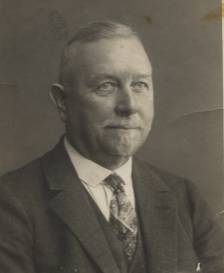The Social Democratic Labour Party of Norway was a Norwegian political party in the 1920s. Following the Labour Party's entry into the Comintern in 1919 its right wing left the party to form the Social Democratic Labour Party in 1921. At the party convention in 1923, however, the Labour Party withdrew from Comintern, and the Communist Party of Norway was formed by the minority, who continued its affiliation with Comintern and the Soviet Union until 1991. The Social Democratic Labour Party was absorbed into the reorganised Labour Party in 1927.

The Reichsbanner Schwarz-Rot-Gold was an organization in Germany during the Weimar Republic with the goal to defend German parliamentary democracy against internal subversion and extremism from the left and right and to compel the population to respect and honour the new Republic's flag and constitution. It was formed by members of the left-wing Social Democratic Party of Germany (SPD), the centre-right to right-wing German Centre Party, and the centrist German Democratic Party in February 1924.
Kattowitzer Volkswille, generally called just Volkswille, was a German-language Social Democratic newspaper published from Kattowitz. The newspaper was founded in 1916 by the Social Democratic Party of Germany (SPD) politician Otto Braun. Initially, the newspaper carried the devise 'Upper Silesian Free Press - Organ of the Upper Silesia Agitation District of the Social Democratic Party of Germany'.

Polish Socialist Workers Party was a political party in Czechoslovakia founded in February 1921, based amongst Polish workers. The party was active in trade union struggles, mainly mobilizing miners and workers in heavy industries. The chairman of the party was Emanuel Chobot. Other prominent members of the party were Antoni Steffek and Wiktor Sembol. The party closely cooperated with the Czechoslovak Social Democratic Party. The party published the newspaper Robotnik Śląski from Fryštát.
The Czechoslovak Social Democratic Workers Party in the Republic of Austria was a political party in Austria, working amongst the Czech minority. The party was founded on December 7, 1919, as the Vienna branch of the Czechoslovak Social Democratic Workers Party separated itself from the party centre in Prague. The party worked closely together with the Social Democratic Workers Party of Austria (SDAPÖ), and cooperated with the Austrian Social Democrats on all political issues. The party contested parliamentary elections on joint lists together with SDAPÖ.

Julius Gehl was a German social democratic politician. Gehl served as the Chairman of the West Prussian District League of the Social Democratic Party of Germany (SPD). Gehl was a prominent leader of the Social Democratic Party of the Free City of Danzig during the interbellum years, serving as its chairman and parliamentary faction leader. Gehl also served as Vice President of the Senate of the Free City.
The Hungarian-German Social Democratic Party was a social democratic political party in Slovakia. It was founded in 1919 by social democrats from ethnic minority communities. The party had a German and a Hungarian section. The German and Hungarian social democrats in Slovakia had developed an antagonistic relationship with the Slovak social democrats, who had merged into the Czechoslovak Social Democratic Workers Party as Austria-Hungary was broken up after the First World War. Issues of contention between Hungarian/German and Slovak social democrats included views of the February Strike of 1919 and the Hungarian Soviet Republic.
The Világosság Socialist Emigrant Group was a Hungarian socialist organization, founded in 1920. The centre of the organization was based in Austria, its founders were mainly former members of the Hungarian Social Democratic Party (MSZDP) who had been forced into exile after the crushing of the Hungarian Soviet Republic. The organization published the monthly Világosság ('Clarity') from 1923 to 1933 in Vienna.
The Socialist Party of Yugoslavia was a political party in the Kingdom of Yugoslavia. The party was founded on 18 December 1921 with Živko Topalović as the secretary and Vilim Bukšeg as the president of the party.
The Communist Party in Danzig was initially founded as a subdivision of the East Prussian section (bezirk) of the KPD. In 1921 a separate party branch of the KPD in the Free City of Danzig was set up. While the Party did not run in the first elections of 1920, twelve members of the USPD in the Volkstag joined the Communist Party on 28 January 1921. In the following elections the Party ran with varying success. In early 1930s, the Communist Party had around 800 members.

Erich Brost was a German journalist and publisher.

The Volkstag was the parliament of the Free City of Danzig between 1919 and 1939.
Anton Plenikowski was a German communist politician of the Free City of Danzig and East Germany.
The Socialist Association was a union of two political parties in Czechoslovakia, the Independent Socialists of Bohuslav Vrbenský and the Independent Radical Social Democratic Party of Vilém Brodecký. The Socialist Association was founded on March 23, 1923, by the fusion of the parliamentary factions of the two groups. The two groups, representing a combined membership of around 15,000, were set to merge but Brodecký's group decided to merge with the Czechoslovak Social Democratic Workers Party instead in 1924. The Independent Socialists, renamed the Independent Socialist Workers Party in June 1924, merged with the Communist Party of Czechoslovakia in September 1925.
The Independent Radical Social Democratic Party was a political party in Czechoslovakia. The party was founded on May 26, 1921. The party was led by Vilém Brodecký.
Arthur Brill was a politician in the Free City of Danzig. Brill was the chairman of the Social Democratic Party of the Free City of Danzig between 1920 and 1936. Brill represented Danzig in the executive of the Labour and Socialist International between January 1929 and 1936. Between July 1931 and 1934 he shared the seat with Johann Kowoll.

The Socialist Youth League of Germany was a youth organization in Germany. SJV was the youth wing of the Socialist Workers' Party of Germany (SAPD). SJV was founded in 1931. The organization was banned after the Nazi take-over 1933.
Sozialistischer Schutzbund was a paramilitary formation in Saar, linked to the Social Democratic Party of Saarland (SPS).
Parliamentary elections were held in the Free City of Danzig on 7 April 1935. The Nazi Party emerged as the largest party, receiving 59% of the vote and winning 43 of the 72 seats in the Volkstag. Voter turnout was reportedly over 99%.
The Arbeiter-Schutzbund was an anti-fascist paramilitary organization in the Free City of Danzig in the early 1930s, being the paramilitary wing of the Social Democratic Party of the Free City of Danzig. The organization had some 4,500 members.





